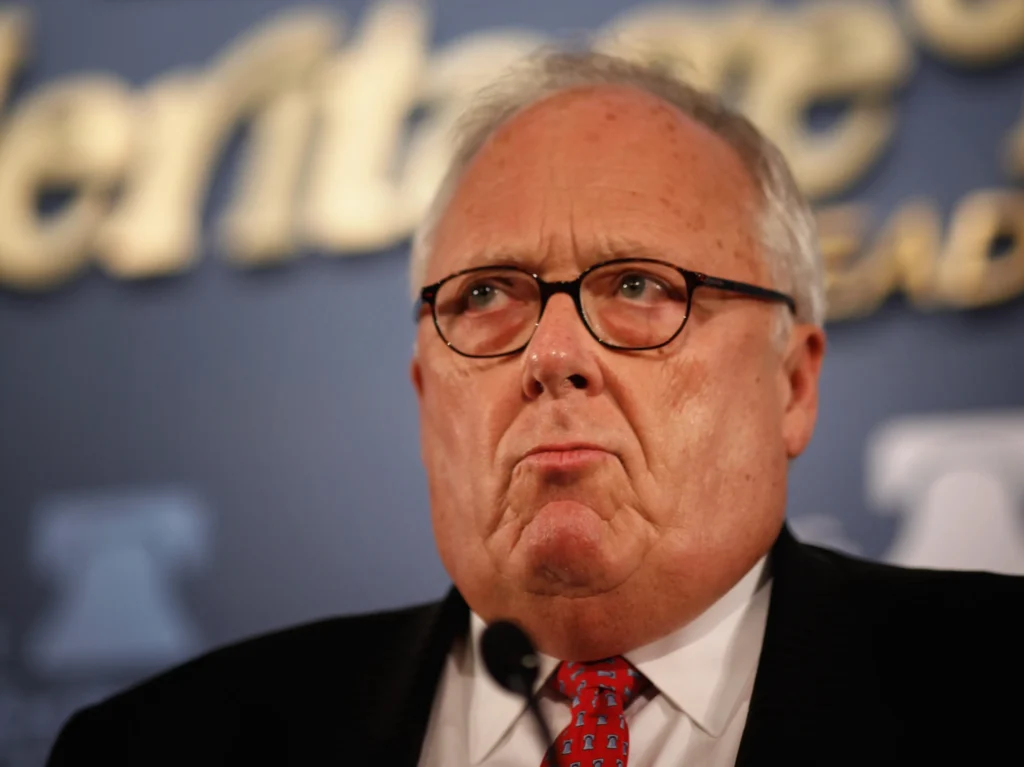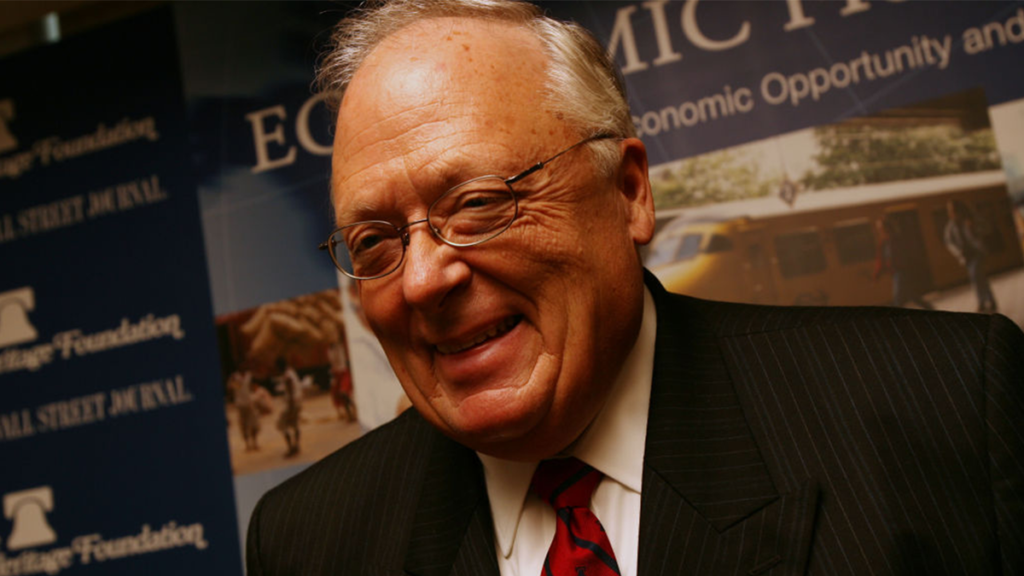Edwin Feulner death has marked the end of an era in American conservative politics. The co-founder and longtime leader of the Heritage Foundation passed away at the age of 83, leaving behind a remarkable legacy that shaped the direction of U.S. policy and governance for decades.
Feulner was not just a political thinker; he was a pioneer who believed that strong ideas could lead to strong policies. He turned the Heritage Foundation into a powerhouse of conservative thought, making it one of the most influential think tanks in the United States.
In this article, we’ll look at Feulner’s life, career, and the impact he had on American politics.
Who Was Edwin Feulner?
Edwin John Feulner Jr. was born on August 12, 1941, in Chicago, Illinois. Raised in a Catholic family, Feulner developed a deep appreciation for traditional values, limited government, and free-market economics from an early age.
He earned his undergraduate degree from Regis University in Denver, then pursued a master’s degree at the University of Pennsylvania’s Wharton School. Later, he studied at the London School of Economics and the University of Edinburgh. His education abroad gave him a global perspective, but his heart remained with shaping conservative thought at home.
Feulner’s intellectual journey would later help him build a platform that became central to modern conservative policymaking.
Founding the Heritage Foundation
The Edwin Feulner death reminds us of the foundation he helped build — literally and ideologically. In 1973, Feulner co-founded the Heritage Foundation along with Paul Weyrich and Joseph Coors. At the time, most think tanks were slow, academic, and not very accessible to policymakers.

Feulner envisioned something different. He wanted Heritage to offer quick, sharp, and action-ready policy recommendations. He called it the “briefcase test”: if a report wasn’t short enough to fit into a policymaker’s briefcase, it needed trimming.
Under his leadership, the think tank grew rapidly. When President Ronald Reagan took office in 1981, Heritage delivered a 1,000-page policy blueprint titled “Mandate for Leadership”, which outlined conservative policy proposals across the federal government. Many of these ideas were adopted by the Reagan administration, validating Heritage’s growing influence.
A Legacy in Policy and Influence
Feulner led the Heritage Foundation from 1977 to 2013, with a brief return in 2017–2018. During his tenure, he turned it into a conservative powerhouse that shaped tax reforms, education policies, welfare restructuring, and national defense.
Key accomplishments under Feulner’s leadership:
- Advocated for Reaganomics and free-market reforms.
- Supported strong national defense policies during and after the Cold War.
- Pushed for welfare reform that led to the 1996 Personal Responsibility and Work Opportunity Act.
- Encouraged school choice, charter schools, and education vouchers.
- Promoted traditional family values and religious liberty.
His ability to connect academics, lawmakers, and grassroots conservatives created a network of influence that extended well beyond Washington, D.C.
Edwin Feulner’s Leadership Style
Feulner was known for being both a strategist and a mentor. He wasn’t a loud or flashy personality, but his calm, organized leadership allowed others to shine. He often focused on the long-term mission rather than short-term political wins.
He believed in building institutions that could outlive individual leaders, and he succeeded. Today, the Heritage Foundation remains a key player in shaping conservative policies — thanks largely to the groundwork Feulner laid over decades.
Honors and Recognitions
Over the years, Edwin Feulner received several honors for his service to public policy:
- Presidential Citizens Medal (1989): Awarded by President Ronald Reagan.
- Bradley Prize (2007): Recognized his work in advancing American values.
- Named as one of Washingtonian magazine’s 25 most influential people in Washington.
Feulner also authored multiple books and contributed to several journals on politics, economics, and leadership.
Personal Life and Values

Despite his busy professional life, Feulner remained committed to his family and faith. He often credited his Catholic upbringing for his moral compass.
He was married to Linda Claire Leventhal, and together they had two children. Feulner kept his private life out of the spotlight, but those who worked closely with him noted his kindness, discipline, and deep sense of purpose.
The Political World Reacts to Edwin Feulner’s Death
Following the Edwin Feulner death, tributes poured in from political leaders, scholars, and activists.
Former Vice President Mike Pence wrote on X (formerly Twitter):
“Edwin Feulner was a giant in the conservative movement. His legacy will live on in the countless lives and policies he helped shape.”
Senator Ted Cruz called Feulner “a quiet architect of the conservative renaissance.”
Even political opponents respected Feulner’s influence. A Democratic strategist tweeted:
“We disagreed on many issues, but Edwin Feulner raised the bar on how policy institutions operate. A respectful rival, and a gentleman.”
His Legacy in Modern Conservative Thought
Even after retiring from his official role, Feulner continued to write and speak about the future of conservatism. He urged younger generations to remain true to founding principles like limited government, personal responsibility, and national sovereignty.
He was concerned about the growing divides within political parties and always promoted unity around shared values rather than personalities.
Today, many rising conservative voices in America point to Feulner as their ideological role model.
What’s Next for the Heritage Foundation?
The Heritage Foundation has already moved into a new era of leadership, but Feulner’s shadow looms large. His methods — rigorous research, practical application, and accessible communication — continue to guide the think tank’s direction.
While new leaders may bring fresh energy and ideas, the core mission remains unchanged: to shape policies that strengthen America’s founding ideals.
As one Heritage staffer put it after hearing of Feulner’s passing:
“We walk a path he paved. We carry the torch he lit.”
Conclusion: A Conservative Titan Remembered
The Edwin Feulner death is more than the passing of a man; it’s the close of a chapter in American political history. Feulner was not just a conservative; he was a builder of the conservative movement.
His leadership at the Heritage Foundation shaped policies that affected millions of Americans — from tax reform to education and welfare. Through it all, Feulner remained humble, disciplined, and committed to principles.
As America reflects on his life and work, one thing is clear: Edwin Feulner’s legacy will continue to shape the future.
Read Next – Only 25% of Americans Say Trump’s Policies Helped Them: What That Means for 2024






